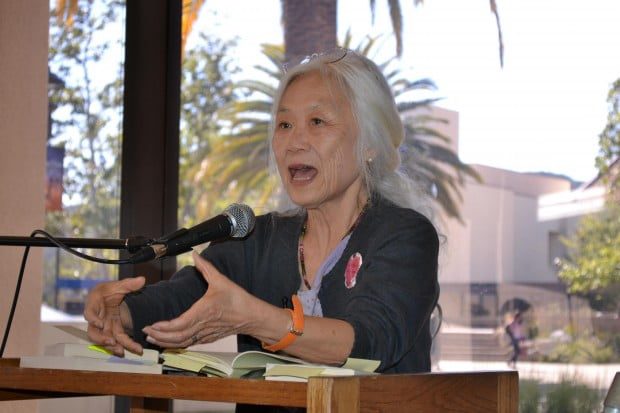With her long mane of white hair tied behind her neck, peering over the top of her glasses, Chinese-American writer Maxine Hong Kingston flashes a broad smile from the lectern.
“I’m going today give you a medley of the work that I have done throughout my life,”
she says in a soft voice, perfect for reciting poetry and prose.
With just these few words 71-year-old Kingston captivates a capacity crowd April 16 at Pepperdine University’s Payson Library, part of the library’s “Year of Diversity” 2011-2012 lecture series.
“I will begin with the first poem that I ever invented,” Kingston says, choosing her words carefully. “Not written because I didn’t know how to write yet. But I did know how to talk.”
The poem, “written” when she was two or three, she says, was inspired by her uncles’ draft horses.
“When we heard the hooves on the street – that beautiful sound – my mother would open the window upstairs and hang me out the window. And then she’d say, ‘Tell them a poem, sing them a song, make them laugh.’ And then she’d squeeze me out the window, and I felt she was squeezing this poem out of me.”
While she can recite the poem from memory in her native Chinese, she explains, she has to read her own English translation:
Hey, third grandfather
Hey, fourth grandfather.
Where are you going?
Horseshoes clippity-clopping
Four feet, then four feet.
Where are you going?
The audience aahs. Kingston laughs.
Not Pulitzer material by any means, but those 22 words represent the foundation of a writing career (including her memoir, “I Love A Broad Margin To My Life”) that has earned Kingston, a senior lecturer for creative writing at UC Berkeley, the National Book Critics Circle Award for “The Woman Warrior” and the National Book Award for “China Men.” She was also awarded the 1997 National Humanities Medal by President Bill Clinton.
Kingston’s diverse fan base includes Pepperdine Dean of Libraries Mark Roosa.
“Her prose and poetry have been landmarks in advancing understanding of the Chinese-American experience,” Roosa said. “Her wit and humanity are inspiring.”
Her wit is at its best when, while she’s reciting, her story is punctuated by the sound of deep snoring coming from an adjoining room. She laughs at the stentorian sleeper and continues reading. The snoring stops.
“It’s been 35 years [since publication],” Kingston says while reflecting on “Woman Warrior.
“During that time I became more and more peaceful. Here I am trying to be a pacifist and here I am responsible for this warrior book. Let me really think about that,” she adds with a laugh.
Her husband, actor Earll Kingston, 73, also laughs. He then joins Maxine at the lectern to act out a scene from “China Men.”
The fictional scene, which takes place in New York City in the ’20s or ’30s, she explains, is based on her father and his friends, employees of a Chinese laundry, on their day off.
“On Saturday, Ed and Woodrow went to Fifth Avenue to shop for clothes. In the three- way mirror he looked like Fred Astaire. Woodrow took a picture of him dancing on the New York Public library steps.”
The couple, married since 1962, clearly enjoys reading and being together.
Following her presentation Kingston fields questions from the audience, mostly women, and many clutching copies of books for Kingston to sign. She does.
Asked about technology’s effect on reading, writing and publishing, Kingston says, “I’m very attached to paper, and I have 12 beautiful fountain pens lined up on my desk. The future of book publishing? Moment by moment this is all changing.”
When and why did she become a writer? a young woman asks.
“I felt I was a writer starting three incarnations ago. My mother said I talked at a very early age. She said, ‘You were born talking!’ Writing is like breathing and eating. It’s such a natural function. It’s just part of me.”

